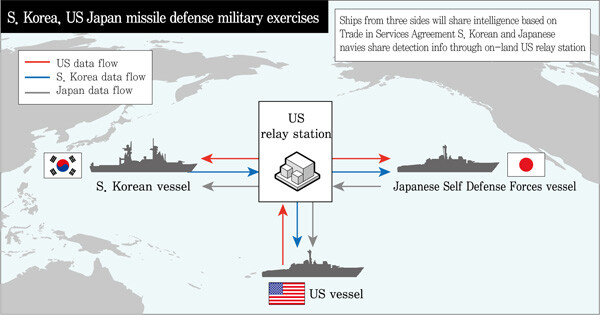hankyoreh
Links to other country sites 다른 나라 사이트 링크
Joint military exercises draw S. Korea closer to US and Japan

Joint military exercises planned for next month by South Korea, the US, and Japan are an expected move after the three sides concluded an agreement on sharing North Korea nuclear and missile intelligence in Dec. 2014, analysts said.
With the agreement clearing the last legal and institutional obstacles to trilateral military defense cooperation, Washington‘s vision for missile defense in Northeast Asia is now taking clear shape - a situation that could lead to US-led missile defense cooperation gaining further momentum going ahead.
For the exercises, Aegis-level destroyers from all three sides will be sharing real-time intelligence online via the US in accordance with their military information sharing agreement. The agreement does not recognize direct sharing between South Korea and Japan, making it a different format from typical trilateral intelligence sharing. But the real-time transmission of missile detection and tracking information online, through an early warning system, is expected to produce the same effect as real-time trilateral intelligence sharing.
The exercises also appear to be a preparatory step for linking of the three sides’ missile defense networks. South Korea and the US have already made plans to complete interlinkage of US Forces Korea‘s missile defense system with Korean Air and Missile Defense (KAMD) system within the year.
With USFK and the Japan Self-Defense Forces (JSDF) already operating linked missile defense systems, the trilateral missile defense exercises appear likely to take place on a regular basis.
The South Korean Ministry of National Defense said on May 16 that the exercises “are merely about sharing missile detection and tracking information and do not include missile interception drills.”
“This has nothing to do with involvement in US-led missile defense,” the ministry stressed.
But missile detection and tracking constitute key early stages in missile defense - which means the sharing of related intelligence cannot actually be called unrelated to missile defense involvement.
Ministry officials were tight-lipped when asked whether there were plans to make the exercises a regular occurrence or how they would be developed in the future.
“Nothing has been decided yet,” one said.
But with trilateral missile defense cooperation having already been set in motion through the sharing of detection and tracking information, analysts said the path is now open for more advanced forms of collaboration such as missile defense control system sharing or command system cooperation - or for de facto incorporation into the US missile defense system.
To date, the US has used the North Korean threat to carefully integrate the South Korea and Japan missile defense systems into the network it directs. Its proposal to South Korea to discuss deployment of a Terminal High Altitude Area Defense (THAAD) system with USFK came just before North Korea’s long-range rocket launch on Feb. 7, while the proposal to hold the trilateral missile defense exercises came two days later on Feb. 9. In both cases, it adroitly took advantage of a political situation where the South Korean public was hard-pressed to say no. A May 16 report in the Asahi Shimbun newspaper noted that South Korea “had consistently avoided policy measures that would provoke China, but after careful consideration made the decision to strengthen cooperation with Japan and the US to oppose the immediate [North Korean] threat.”
Many have voiced fears about South Korea being needlessly drawn into US-led trilateral missile defense cooperation with the ultimate aim of keeping China in check. Others have advised wariness of a trilateral cooperation framework that would increase Japan’s voice on peninsula issues.
“With these exercises, we’ve taken the first step toward being incorporated into US missile defense irrespective of our intentions,” said Yonsei University professor Choi Jong-geon.
“We could end becoming an outpost in a US Northeast Asia missile defense system targeting China,” Choi warned.
By Park Byong-su, senior staff writer and Gil Yun-hyung, Tokyo correspondent
Please direct questions or comments to [english@hani.co.kr]

Editorial・opinion
![[Column] Park Geun-hye déjà vu in Yoon Suk-yeol [Column] Park Geun-hye déjà vu in Yoon Suk-yeol](https://flexible.img.hani.co.kr/flexible/normal/500/300/imgdb/original/2024/0424/651713945113788.jpg) [Column] Park Geun-hye déjà vu in Yoon Suk-yeol
[Column] Park Geun-hye déjà vu in Yoon Suk-yeol![[Editorial] New weight of N. Korea’s nuclear threats makes dialogue all the more urgent [Editorial] New weight of N. Korea’s nuclear threats makes dialogue all the more urgent](https://flexible.img.hani.co.kr/flexible/normal/500/300/imgdb/original/2024/0424/7317139454662664.jpg) [Editorial] New weight of N. Korea’s nuclear threats makes dialogue all the more urgent
[Editorial] New weight of N. Korea’s nuclear threats makes dialogue all the more urgent- [Guest essay] The real reason Korea’s new right wants to dub Rhee a founding father
- [Column] ‘Choson’: Is it time we start referring to N. Korea in its own terms?
- [Editorial] Japan’s rewriting of history with Korea has gone too far
- [Column] The president’s questionable capacity for dialogue
- [Column] Are chaebol firms just pizza pies for families to divvy up as they please?
- [Column] Has Korea, too, crossed the Rubicon on China?
- [Correspondent’s column] In Japan’s alliance with US, echoes of its past alliances with UK
- [Editorial] Does Yoon think the Korean public is wrong?
Most viewed articles
- 1[Column] Park Geun-hye déjà vu in Yoon Suk-yeol
- 2N. Korean hackers breached 10 defense contractors in South for months, police say
- 3Will NewJeans end up collateral damage in internal feud at K-pop juggernaut Hybe?
- 4Kim Jong-un expressed ‘satisfaction’ with nuclear counterstrike drill directed at South
- 5[Editorial] New weight of N. Korea’s nuclear threats makes dialogue all the more urgent
- 6[Cine feature] A new shift in the Korean film investment and distribution market
- 7[Column] ‘Choson’: Is it time we start referring to N. Korea in its own terms?
- 8[Column] The clock is ticking for Korea’s first lady
- 9[Editorial] Japan’s rewriting of history with Korea has gone too far
- 10Thursday to mark start of resignations by senior doctors amid standoff with government